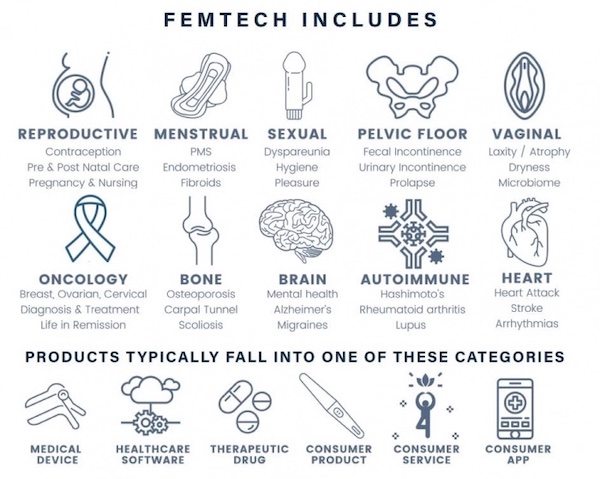Femtech is a rapidly growing industry. Analysts project the industry to reach $3 billion by the end of 2030, up significantly from its $820.6 million value in 2019. Additional forecasts estimate that fertility solutions, a subset of femtech, will reach $41 billion in sales by 2026. With a 64% increase in sizable venture capital exits since 2018, femtech is ripe for investment and innovation.
Marshall Gerstein is well-equipped to help clients develop and protect their femtech innovations and has a longstanding commitment to clients in female health, assisting clients with intellectual property matters in various areas in the U.S. and around the world. Such areas include breast pump systems and methods, menstruation products, nursing and lactation garments, maternal fetal medical devices, and wearables to treat menstrual pain. We have the technical expertise to assist innovators in any area of science, from medical devices to AI to pharmaceuticals, and are excited to continue to support and protect innovative solutions in this expanding industry.
Our team includes highly experienced women in various stages of life and technological backgrounds, including those in mechanical engineering, biotechnology, electrical engineering, chemical engineering, artificial intelligence, copyright, and trademark law. Members of our team have also presented on intellectual property issues at various femtech-related industry events, and actively engage in conversations to destigmatize women’s health and wellness.
What is Femtech?
The femtech industry generally refers to the range of devices, treatments, software, consumer products, therapeutic drugs, and educational resources designed for the biological and socio-emotional needs of those assigned female at birth to increase autonomy over one’s health. As a newer field striving to challenge sex-based discrepancies in the healthcare system, the femtech industry has plenty of areas into which it can expand. Such areas include reproductive, menstrual, sexual, pelvic floor, vaginal, oncology, bone, autoimmune, neurological, and cardiovascular health, for example. A subcategory of health technology, femtech challenges the systemic exclusion of women’s health needs by creating targeted female-centric solutions for those needs.

Source: FemTech Focus
Femtech Industry Expansion: New Solutions for Long-felt Problems
A host of factors have contributed to the rapid growth of the femtech industry, including the increasing presence of women in venture technology, the growing awareness of women’s health issues, the destigmatization of female health, and the increasing affordability of personalized health solutions and telemedicine. Regulatory agencies are increasingly approving modern digital applications to address women’s health needs, and venture capital funding in femtech has steadily increased since 2011, with personalized wellness technology as a top-five investment area in digital health.
The rise of preventative medicine and holistic health has also contributed to the growth of femtech as people seek solutions for the root causes of their health problems rather than treatments for their adverse effects. Advancements in health technology have increased the accessibility and affordability of personalized health solutions.
As innovation in femtech accelerates, the diversification of the venture capital world will make investment in femtech more accessible. With the diversification of venture capital, more research and funding will be invested in creating solutions to long-felt problems in women’s health, inevitably leading to expansion of innovation and the need to protect these innovative solutions. Marshall Gerstein is following these trends and is available to help founders protect their innovation as they continue to make breakthroughs in this area.
